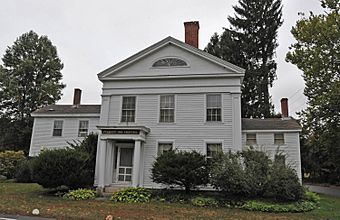Burnett's Corner, Connecticut facts for kids
Quick facts for kids |
|
|
Burnett's Corner Historic District
|
|
 |
|
| Location | Along Packer Rd., S of CT 184, Groton, Connecticut |
|---|---|
| Area | 45 acres (18 ha) |
| Architectural style | Colonial, Greek Revival |
| NRHP reference No. | 97001468 |
| Added to NRHP | December 4, 1997 |
Burnett's Corner is a small, historic village located in the town of Groton, Connecticut, in the United States. It's famous for its Burnett's Corner Historic District, which is a special area listed on the National Register of Historic Places. This means it's an important place with old buildings and history worth protecting!
Contents
The Story of Burnett's Corner
Burnett's Corner started growing a long time ago, in the 1700s and 1800s. It became a busy spot where important roads met, like a "crossroads village." It was also a popular stop for stagecoaches traveling between New York City and Boston on the old Post Road.
The village got its name from Richard Burnett (1801–1890). He used to be a sea captain and ran the Pequot Hotel. This hotel was a place where travelers could stay overnight when they were on the Post Road.
Changes Over Time
In 1858, something big happened: a railroad was built through the area. This railroad made it much faster to travel, and soon, most people stopped using stagecoaches. Because the railroad didn't go directly through Burnett's Corner, the village became less busy for travelers.
Later, in the early 1900s, Burnett's Corner had some small factories. One interesting factory made witch hazel, which is used in some medicines and skin products. Another factory made twine and rope.
In the 1930s, a new big road called the Gold Star Highway was built nearby. This changed Burnett's Corner again. It became a place where people lived and then drove their automobiles to work in other towns. This is what we call a "suburban community."
What is the Historic District?
The Burnett's Corner Historic District was officially added to the National Register of Historic Places in 1997. This means it's recognized as a very important historical area.
The district covers about 45 acres along the old Post Road, which is now called Packer Road. It includes 30 buildings that are considered "contributing buildings." This means they are old and important to the history of the area. There are also three other important historical sites within the district.
Special Buildings
The buildings in the district show different styles of homes from the 1700s, 1800s, and 1900s. You can see great examples of Colonial style and Greek Revival style. These styles show how buildings were designed a long time ago.
One of the most important buildings is the Pequot Hotel. It was built around 1842 and is a beautiful example of the Greek Revival style. It stands right in the middle of the historic district.
 | Isaac Myers |
 | D. Hamilton Jackson |
 | A. Philip Randolph |



